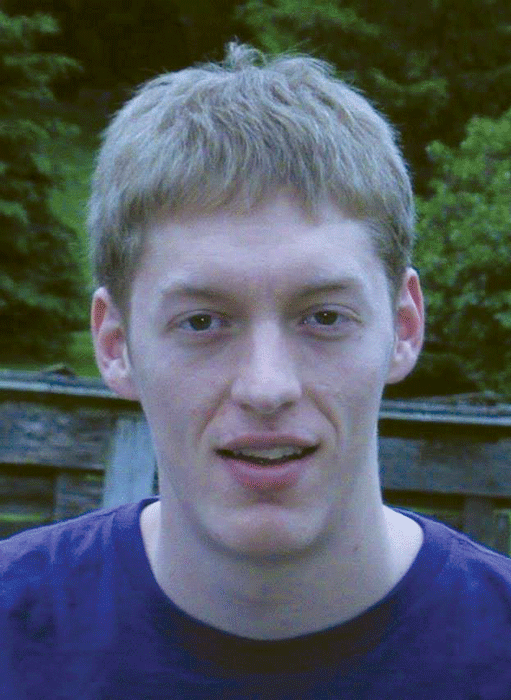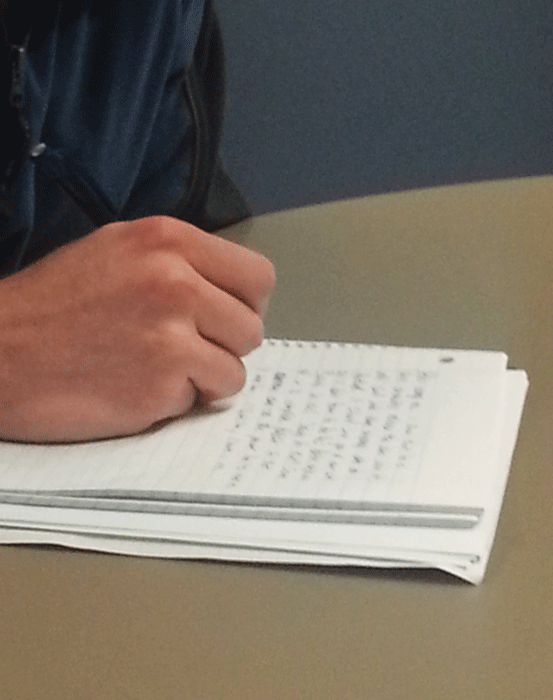War of the prose
UW-Eau Claire poetry student makes a different “Final Four”
April 9, 2014
After taking a creative writing class and not doing well, some college students might get discouraged. For one student, that led him to the career path he wanted to pursue.
Josh Close, a senior and former elementary education major, switched to a creative writing major after he took a class and realized writing was for him, even though that class was not.
“I was writing for children in a creative writing class for adults, and it still made me decide that I had this love for writing, and it’s kind of just grown from there,” Close said.
Close is currently in the final round of #MMPoetry, or March Madness Poetry, which is a children’s poetry contest hosted by thinkkidthink.com that follows the same framework as the NCAA March Madness tournament.
For every round, each “authlete” is given a different word that they have 36 hours to incorporate into a children’s poem and submit, which then goes to a vote between him or her and the competitor. The winner of that round moves on.
The national competition, which started with 64 poets, is now down to the final two, with one of them being Close.

Close said he heard about the competition last year when an author he followed on Facebook posted something about it, and he decided to enter. He participated last year, and even though he only made it past the first few rounds, he said it was enough to persuade him to come back.
“(The director) reveals the bracket on a certain date, and I just remember watching it and just seeing if my name would pop up,” he said. “I guess I wasn’t as nervous for it this year because I figured I’d have a decent chance of getting in based on last year.”
Not that it gives him any better of a chance. As far as competition goes, Close said he is one of the youngest, least-known poets competing.
“Honestly I look at my competitors for future rounds, and I just write the poem, and I didn’t necessarily think I’d get this far,” he said.
Yet here he is, one of two remaining poets fighting for that winning title.
This year, instead of just doing a public vote in which anyone who has the link can vote, Close said two additional voting categories were added, the authlete and classroom votes.
The authlete vote is where all of the other competing poets can cast their vote, and the classroom vote is a section that has been opened specifically to students around the nation.
Each registered teacher can take a class vote, log in on the website and cast one vote per class.
Because his competitor, Samuel Kent, is a published writer and illustrator from Alabama, Close said the vote he is most worried about is the public vote because he knows Kent has a larger network of people who know who he is.
Despite this, Close said because they added the other two categories, he still believes he has a chance to win.
“I could lose the public vote 800 to 200 in this final round, but if I win the other two categories I’ll win anyways so that’s what I’m hoping for,” he said.
Rob Reid, a professor in the education studies department at UW-Eau Claire, had Close in his Children’s Literature and Literature for Adolescence classes and said he has seen a great deal of his writing and thinks Close’s strongest poetry is his light, humorous verse.
“I’ve seen his progress over the last three years, and he is getting much smarter with his word choice and his rhyme and rhythm, as evidenced by

his participation in this ThinkKidThink program,” Reid said.
While Reid said the program is not well-known in the area, it is still impressive in the poetry and writing community to see someone he knows not only get accepted into the competition but continue to win.
He said while he was initially surprised Close made it this far in the competition, after thinking about his talent and skill, it wasn’t as much of a shock.
“This is really what he wants to do, and he’s become more skilled at so I’m happy that he has made it this far,” Reid said.
“So when I think about his determination I could say, ‘well then it makes sense that he’s gone this far.’”
Deedee Close, Josh’s mother, said she was a little concerned when he told her he was taking on this competition because she knew, between an internship and 18 credits, this was a busy semester for him.
Now that she has seen his progress, she said she is glad he did it.
“It’s a gift. I don’t know how he does it,” she said. “He gets this word, and the poem is there, you know, in a few hours.”
After graduation, Josh Close said he hopes to continue using this gift by taking a few years off, maybe being a substitute teacher and concentrating on getting his work out there.
Even if he doesn’t win, he said The March Madness children’s poetry contest is a good place for him to start, and he said he is hoping that making it this far will catch a publisher’s eye.
“I think I’ll apply for it every year as long as I don’t get … well I guess I can’t get much busier than this semester,” he said. “I think I’ll keep doing it.”
In the future, Josh Close said his minor in library science could help him land a job owning a small-town library, but ideally he has much bigger hopes than that.
“To be a published author, and make a career off that, that would be great, but it’s kind of a risky deal,” he said.
Josh Close said if he wins this competition he will get a trophy with his name on it, which he can keep for the next year and hopefully will gain some more popularity with his writing.
Voting for the final round will close Thursday evening, and he will find out sometime after that if he will bring home the trophy.



